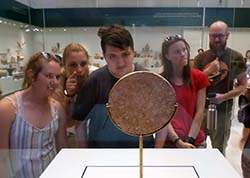NORFOLK, NE - “It all started in Greece.” That’s how Adam Peterson, Northeast Community College theatre instructor, summarized The History and Mythology of Greece from the Bronze Age to the Hellenistic Age, a class he co-taught this spring with Paul Muncy, history instructor.
The semester-long course provided a rich, comprehensive study of Greek history through the lenses of mythology, philosophy, culture, politics and theatre.
“Greece is the cradle of Western civilization,” Peterson said. “And history, of course, is a big piece of that, but so many other cultural aspects play into how those histories were told. Theatre and mythology dictated the Greeks’ worldview. And we wouldn’t have theatre in its current form if it hadn’t started in Greece. People in theatre today call themselves ‘thespians.’ That’s after a man named Thespis, who was the first actor to step forth from the chorus and take the stage. It’s all right there in Greece.”
Muncy said studying the nature of the Greeks can give students a deeper understanding of today’s society.
“The most fascinating part of Greek culture to me is the philosophical evolution,” Muncy said. “We’re trying to speculate what it was actually like to be a Greek in this strange, very different world. When I study history, it is so much about understanding humanity as a whole and understanding better who we are. Greece is so integral to who we are in the modern day.”
The students had an even more in-depth chance to study Greek civilization at the end of the semester, when Peterson, Muncy and 14 of the students traveled to the country to experience it firsthand. They visited a number of sites crucial to the development of Western civilization, including the Acropolis, National Archeological Museum, the ruins of Delphi, Olympia, Corinth and the island of Crete.
Before the trip, student Jessica Metcalf, Norfolk, said she was drawn to the class because she had enjoyed working with Muncy and Peterson in the past and also loves to travel.
“But I’ve never done so much to prepare for travel,” she added. “I’m really looking forward to the pairing of studying all this and then actually going to see it, to touch it. I love taking a class and getting all this factual knowledge that goes along with the learning process, but also being able to see it in real life is going to be really, really neat.”
Muncy and Peterson credited Northeast’s international focus for making the class possible. Providing a globally competitive workforce is one of the four goals of the College’s Vision 2020 strategic plan.
“Northeast has been such an advocate for a more cosmopolitan view of the world, both in terms of us bringing in students from around the globe and having programs that allow our students to travel the world,” Muncy said. “It is one of the greatest services this college offers. I am so proud to be part of a college that really emphasizes the importance of understanding others.”
Student Finn Valle, Norfolk, said what isn’t known about the Greeks can be even more interesting than what is. The class’s trip included a visit to the archaeological site of Mycenae, a civilization that pre-dated the Greeks and experienced a region-wide collapse for reasons that are not entirely understood.
“The most interesting (aspect of class) is learning about all these civilizations,” Valle said. “Some grew and others collapsed, just fell off the face of the earth. And we don’t know what happened. That’s just so interesting to me. There was a whole other time period where these people were living and basically prospering, and then were just wiped out. We don’t know exactly what happened during that collapse.”
Peterson said he was excited to visit Epidaurus, one of the best preserved theatres of the ancient world.
“You can stand on the stage and whisper, and anyone in the space can hear what you’re saying. It’s the ideal space for acoustics, and (historians) don’t know whether that developed because of pure chance, or because of experience, but the Greeks figured out the perfect way to achieve it.”
Peterson said that while the class’s focus on history, theatre and mythology is important, broadening his students’ worldview remains equally essential to the learning process.
“So many students (in northeast Nebraska) don’t get the opportunity to travel and get exposed to different cultures. I grew up here in Norfolk myself, and as soon as I started traveling, my entire worldview changed. We’re going to break down misconceptions and stereotypes, and I hope the students learn that no matter where you go, people are just people trying to live the best life that they can. Culture is how people react to the cards they were dealt and how they learned to live in that place and that time.”
Valle said all students should have the opportunity to travel, even if they may be unsure of it.
“Don’t let the anxiety of not knowing keep you away from it. Because that is something I’ve struggled with when I wanted to do something, the anxiety of ‘Is it going to turn out right?” and ‘What else is going to happen?’ All these insecurities start popping up. But don’t let that anxiety take hold of you. Just see how far you can go and how (travel) can expand your world.”
--###--
PHOTO CUTLINE
Students in The History and Mythology of Greece from the Bronze Age to the Hellenistic Age course at Northeast Community College examine a tablet at the Heraklion Archaeological Museum on the island of Crete during the class’s recent trip to Greece. Pictured (from left) are Kennison Kunz, Stuart, Ashlee Novotny, Clarkson, Finn Valle, Norfolk, Jessica Metcalf, Norfolk, and Paul Muncy, Northeast history instructor.

